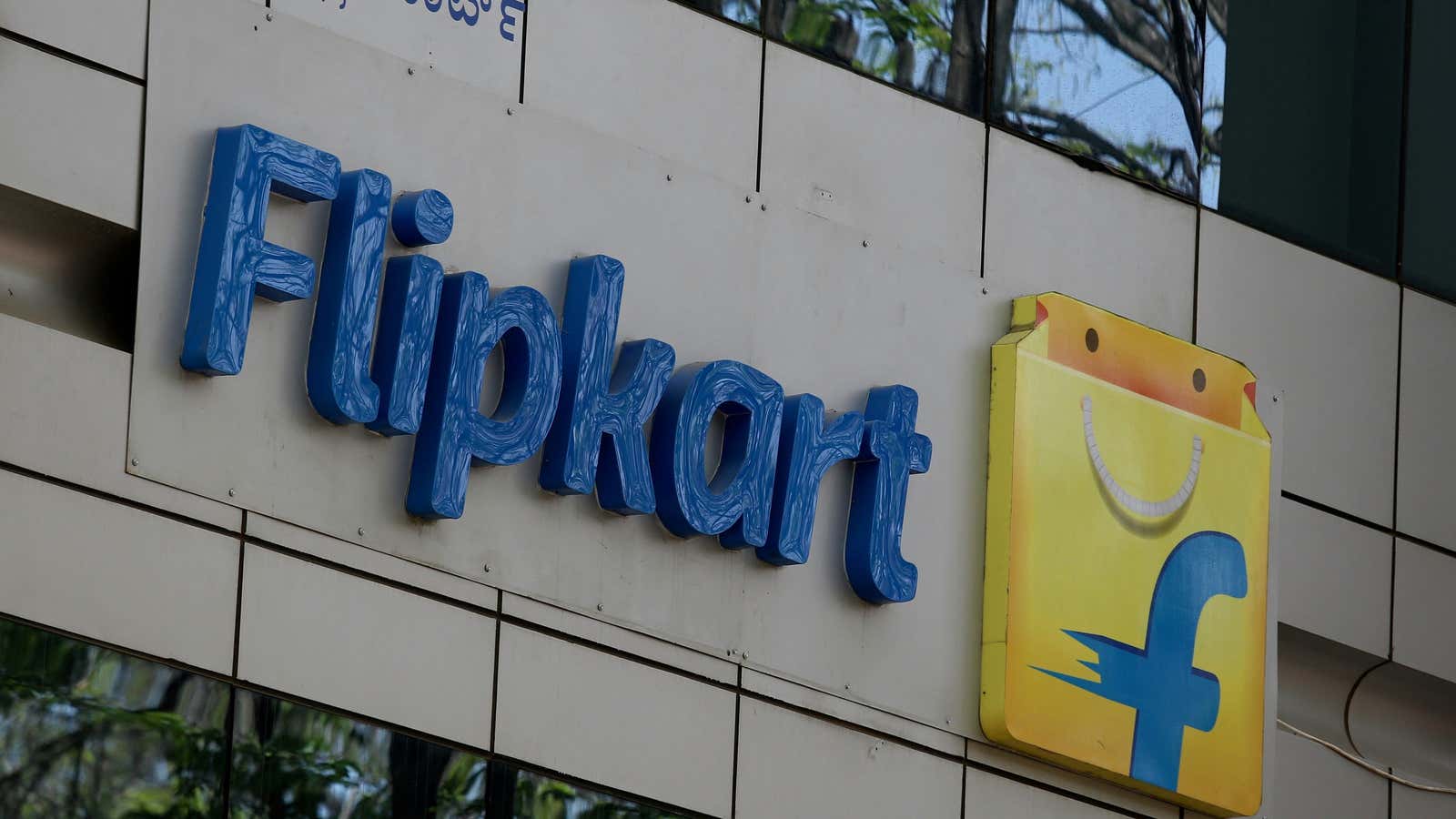The Indian e-commerce sector seems to have turned into a battleground for two American giants.
Over the recent weeks, several news reports have suggested that retail major Walmart and e-commerce behemoth Amazon are in the fray to acquire a majority stake in Bengaluru-based Flipkart. Currently, Japan’s Softbank is the largest investor in the company.
Last week, Reuters reported that Arkansas-based retail giant Walmart has completed its due diligence on Flipkart and has made a proposal to buy a 51% stake in it for between $10 billion (Rs66,527.5 crore) and $12 billion (Rs79,833 crore). The deal could close by the end of June, the news agency said.
At the same time, Seattle-based e-commerce major Amazon, too, is trying to acquire a significant stake in the Indian e-retail major, FactorDaily has reported. The US firm has even offered a “breakup fee” of up to $2 billion. A breakup fee is a penalty set during the process of takeover agreements, to be paid if the target backs out of the deal. The fee underscores the seriousness of the negotiations.
Meanwhile, none of the three companies has so far commented on the reported talks. Walmart and Flipkart did not respond to emails from Quartz. “We do not comment on rumours and speculation,” an Amazon India spokesperson said.
But whichever way the deal goes, it will mark a significant milestone for the Indian e-commerce sector.
Why Flipkart matters?
Despite its mounting losses, Flipkart is widely considered one of the most successful Indian startups. Holding a controlling stake in the company can go a long way in ensuring a win in the Indian retail space.
For one, Flipkart is the world’s third-most funded private company, having raised over $7 billion from some of the best-known global investors such as Softbank, Tiger Global, DST Global, Morgan Stanley, and Accel Partners, among others.
Founded in 2008 by IIT-Delhi alumni Sachin Basal and Binny Bansal (not related), Flipkart is the most valued Indian internet business, commanding a peak valuation of over $15 billion.
The company has made at least 10 acquisitions in the 10 years of its existence. Its purchases include online lifestyle retailers Myntra and Jabong which have made Flipkart a leader in the segment by a wide margin. The firm employs around 8,000 permanent employees and over 20,000 contract workers.
While Flipkart is often looked at as an Amazon rip-off, the company, to its credit, was the first to introduce the “cash on delivery” payment method, one of the biggest factors for its success.
The company has also managed to establish itself in an overcrowded market, overtaking once close rival Snapdeal which imploded in 2017.
Flipkart has a higher level of trust among Indian shoppers as compared to even Amazon, according to a December survey by e-commerce advisory firm RedSeer Consulting.
Flipkart and Walmart
Despite having entered India over a decade ago, Walmart’s presence in the country has been limited to just around 20 business-to-business stores, thanks to the government’s restrictive policies and a failed joint venture. In 2014, the company had said that it planned to look at e-commerce to expand its footprint in India. However, there hasn’t been much action on that front till now.
Having Flipkart in its kitty could finally help Walmart establish itself in India’s $670 billion retail market.
Since the company is still tied down by policy constraints, ”Flipkart is the perfect match where Walmart can capture more of the Indian retail market,” Ankur Bisen, vice-president for consumer and retail at consulting firm Technopak Advisors, told Quartz.
A traditional brick-and-mortar retailer, Walmart has already made several organic and inorganic moves in the US to woo buyers who are increasingly moving online. A similar strategy could work in India. It helps that the Indian e-commerce space is still not as cut-throat as the US or other Asian countries, Bisen said. ”In terms of competition intensity, India has few key players vying for e-commerce dominance compared to other Asian markets such as Japan and China,” he added.
Flipkart also stands to gain from the over $3 trillion Walmart’s retail experience of more than 50 years in the US.
“The biggest impact this investment will have is that Flipkart will have an investor who understands retail and has done it at scale,” Yugal Joshi, vice-president of Texas-based consulting and research firm Everest Group, said in February.
“But given their history, Amazon must be prepared for such a move by Walmart.”
Flipkart and Amazon
The two companies have fought an epic battle for supremacy over the last five years, from teasing each other to taking pot shots and from poaching talent to lobbying the government. Yet, neither is close to being a clear winner.
While Flipkart wins on some parameters, Amazon is ahead on others. For instance, while Indian shoppers trust Flipkart more than Amazon, the shopping experience on the latter is deemed better.
Once a deal is struck between Amazon and Flipkart, the combined entity can focus on profitability rather than the competition, according to experts.
Amazon’s investments in discounting, advertising, and logistics in India have been among the biggest drivers of incremental losses for the company in the recent years, Morgan Stanley Research said in a report on April 12. “As such, in our view, Amazon’s potential willingness to pay for Flipkart is likely driven by the notion that a combined Amazon and Flipkart would lead to a less competitive or more rational environment (less discounting, etc.) going forward. It could also enable Amazon to scale its budding logistics network faster and more profitably,” it said.
However, Flipkart’s co-founders, once Amazon employees, favour Walmart as a potential investor as that will allow them to continue leading the company, Bloomberg reported, quoting unidentified sources.
And even if Amazon does buy a stake in Flipkart, it could face regulatory challenges as the combined entity will be a dominant player and may trigger anti-competition issues.
Suneera Tandon contributed to this story.
